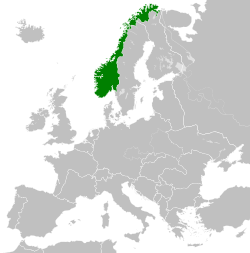Quisling government
| Nasjonale regjering | ||||||||||
|
Autonomous puppet government in German-occupied Norway |
||||||||||
|
||||||||||
| Capital | Oslo | |||||||||
| Languages | Norwegian | |||||||||
| Religion | Lutheranism | |||||||||
| Government | Fascist one-party state | |||||||||
| Reichskommissar | ||||||||||
| • | 1940–1945 | Josef Terboven | ||||||||
| • | 1945 | Franz Böhme (acting) | ||||||||
| Minister-President | ||||||||||
| • | 1942–1945 | Vidkun Quisling | ||||||||
| Historical era | World War II | |||||||||
| • | Proclamation | 1 February 1942 | ||||||||
| • | German capitulation | 9 May 1945 | ||||||||
| Area | ||||||||||
| • | 1942 | 323,782 km2 (125,013 sq mi) | ||||||||
| Currency | Norwegian krone (NOK) | |||||||||
|
||||||||||
| Today part of |
|
|||||||||
The Quisling regime or Quisling government are common names used to refer to the fascist collaborationist government led by Vidkun Quisling in German-occupied Norway during the Second World War. The official name of the regime from 1 February 1942 until its dissolution in May 1945 was Nasjonale regjering (English: National Government). Actual executive power was retained by the Reichskommissariat Norwegen, headed by Josef Terboven.
Given the use of the term quisling, the name Quisling regime can also be used as a derogatory term referring to political regimes perceived as treasonous puppet governments imposed by occupying foreign enemies.
Vidkun Quisling, Fører of the Nasjonal Samling party, had first tried to carry out a coup against the Norwegian government on 9 April 1940, the day of the German invasion of Norway. At 7:32 p.m., Quisling visited the studios of the Norwegian Broadcasting Corporation and made a radio broadcast proclaiming himself Prime Minister and ordering all resistance to halt at once. He announced that he and Nasjonal Samling were taking power due to Nygaardsvold's Cabinet having "raised armed resistance and promptly fled". He further declared that in the present situation it was "the duty and the right of the movement of Nasjonal Samling to take over governmental power". Quisling claimed that the Nygaardsvold Cabinet had given up power despite that it had only moved to Elverum, some 50 km (31 mi) from Oslo, and was carrying out negotiations with the Germans.
The next day, German ambassador Curt Bräuer traveled to Elverum and demanded King Haakon VII and the legitimate Norwegian government return to Oslo and go into coalition with Quisling. However, Haakon told the Cabinet that he could not in good conscience appoint Quisling as prime minister, and would abdicate rather than appoint a government headed by him. By this time, news of Quisling's attempted coup had reached Elverum. Negotiations promptly collapsed, and the government unanimously advised Haakon not to appoint Quisling as prime minister.
...
Wikipedia



